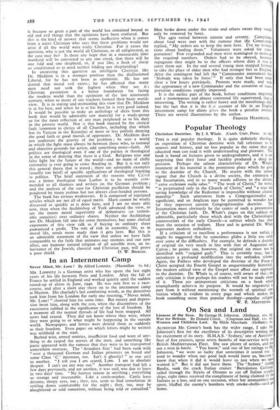In an Internment Camp
Never Mind, Mr. Lom ! By Alfred Lomnitz. (Macmillan. 7s. 6d.) MR. LOMNITZ is a German artist who has spent the last eight years of his life between Paris and London. After the fall of France he settled in England and worked quietly until the sudden round-up of aliens in June, 1940. He was sent first to a race- course, and after a short stay there on to the internment camp at Huyton. His charlady's last comforting words, as the detectives took him from his London flat early one morning, " Never mind, Mr. Lom! " cheered him for some time. But misery and depres- sion beset him, along with the rest, when the discomforts of the racecourse rubbed in the significance of the loss of freedom. In a moment all the normal threads of life had been snapped. All news had ceased. They did not know where they were, where they were going to or what might be happening in the outside world. Newspapers and letters were denied them as suddenly as their freedom. Even paper on which letters might be written was withheld at the start.
Barbed wire, armed sentries, insufficient food and want of any- thing to do rasped the nerves of the men, and something like panic appeared with the rumour that they were to be transported somewhere overseas. The Arandora Star' had been sunk with " over a thousand German and Italian prisoners on board and some Class C' internees, too. Isn't it ghastly? " as one said to another. " I tell you I am scared, Lom. I am in absolute despair. I can't see any way out." Another transport had left a few days previously, and yet another, it was said, was due to leave in two days' time. " No human reason in anything ; everything so strange and inscrutable. Like a cattle-market. Cattle have dreamy, sleepy eyes, too ; they, too, seem to find consolation in settling down comfortably for the night ; they, too, may be slaughtered or sold tomorrow, without being told or consulted." Men broke down under the strain and others swore they would only be removed by force.
The ages varied between sixteen and seventy. Complaints about food were met with the rumour that tffe Commando replied, " My orders are to keep the men here. I've no instrur, lions about feeding them." Volunteers were asked for trans. portation! Few responded and men were nominated to make up the required numbers. Orders had to be obeyed, however repugnant they might be to the officers whose duty it was to carry them out. In the end several young men stepped forward to take the place of older men who had stronger -ties in England, After the contingent had left the " Commander announced that Nobody was taken by force." If only that had been made clear a few hours previously. Protests were made, and with the appearance of a new Commander and the cessation of trans. portation conditions rapidly improved.
It is the earlier part of the book, before conditions improved and a monotonous and almost contented life supervened, that is interesting. The writing is rather heavy and the moralisings dull. but the fact that it is the first account of life in an English internment camp for aliens gives the book a peculiar interest There are several illustrations by the author.
FRANCIS HEATHCOTE.


























 Previous page
Previous page